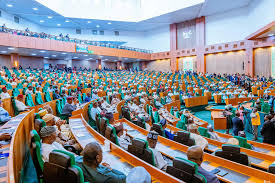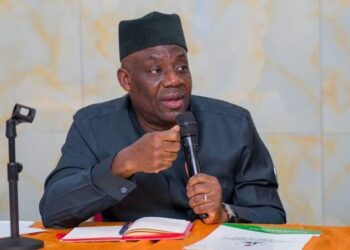On Thursday, a law that would require all Nigerians of voting age to cast ballots passed second reading in the House of Representatives.
In order to make voting mandatory for eligible Nigerians, the proposed law, titled “A Bill for an Act to Amend the Electoral Act 2022 to Make It Mandatory for All Nigerians of Majority Age to Vote in All National and State Elections and for Related Matters”, was created.
Nigerians of voting age who do not cast ballots during elections might face up to six months in prison or a fine of up to N100,000, according to the measure, which was first submitted by Speaker of the House Abbas Tajudeen in February.
Daniel Asama, the bill’s co-sponsor and representative for the Bassa/Jos North Federal Constituency, presented the measure at Thursday’s plenary session. He made the case that mandatory voting will improve civic engagement, increase democracy, and decrease voter apathy.
He contends that when people actively participate in choosing their leaders and determining the course of government, democracy flourishes.
He bemoaned Nigeria’s consistently low voter turnout, saying it erodes democratic institutions and election legitimacy.
“Voting is not only the right but a civic responsibility. For global precedents, several democracies, including Australia, Belgium and Brazil, for instance, have adopted mandatory voting for the positive outcomes in terms of political participation and public accountability. For electoral apathy and voter inducement, mandatory voting can significantly reduce the influence of vote buying as more citizens vote,” the lawmaker argued.
Deputy Speaker Benjamin Kalu backed the measure in his presentation, calling it an excellent idea and a step towards establishing civic duty.
He claims that while Nigerians are quick to criticise governments, they take a long time to complete their civic duties.
Kalu said, “In other climes that we have travelled to or lived in, personally in Australia, it is actually an offence for you not to vote during elections. So it is a good proposition coming from you and the person that partnered with you to sponsor this bill.”
But the member representing the Andoni-Opobo/Nkoro Federal Constituency, Awaji-Inombek Abiante, questioned the bill’s practicality and enforceability.
According to him, “It is not just enough to legislate compulsory voting. How will it be enforced?
“There are people who register in this country, and they are in Ghana, they are in the US, they are in Australia, and they are in London. Who will provide the logistics for them to come? If you say it is compulsory, you probably will deny them a renewal of their passports. So how will they get to my village, for instance?” Abiante queried.
He questioned whether it would be just to penalise citizens who are unable to attend voting places because of systemic issues and cautioned against enforcing sanctions in a system that is still beset by infrastructure deficiencies.
However, Kalu raised a point of order, warning Abiante not to make pointless contributions and emphasising that members should limit their arguments to the bill’s principle rather than its execution issues.
“What we are discussing is whether or not it should be mandatory for citizens to participate in elections. When it is time for debate on the budget or economic policies of the country, we can go into all that. What we are talking about is our electoral laws.
“It is good for Nigeria to show patriotism, that spirit of nationalism, participating in what is going on in your country, not just criticising,” the deputy speaker stated.
Abbas, however, clarified that there is no law without exemption, assuring that there could be exemptions in certain cases.
Another lawmaker, Esset Udo, representing Uyo/Uruan/Nsit Atai/Asutan/Ibesikpo Federal Constituency, supported the spirit of the bill but expressed scepticism about citizens’ confidence in the electoral process.
He said, “It is a good and wonderful bill. Mandating citizens to vote is not the problem but a situation where citizens have lost confidence in the system. We should also make a law that will make votes count. The last election, the chairman of the Independent National Electoral Commission and his officials gave all sorts of promises, but we saw all what happened.
Once more, Kalu closed the comment, stating that it was against House rules.
However, Speaker Abbas acknowledged Udo’s worries and proposed that mandatory voting would actually contribute to a recovery of public trust in governance and leadership.
Speaking as well, Dr Ghali Mustapha Tijjani, a member representing the Albasu/Gaya/Ajingi Federal Constituency, called the bill one of the best and most distinctive that has been filed this year.
After an exhaustive debate, the Speaker put the question to a voice vote. Though a section of the chamber shouted “nay” more loudly, Abbas ruled in favour of the “ayes”.
The bill was subsequently referred to the House Committee on Electoral Matters for further legislative action.




































